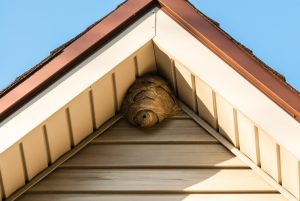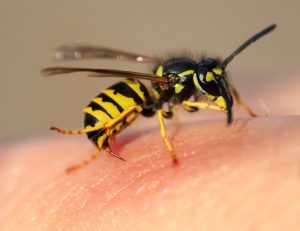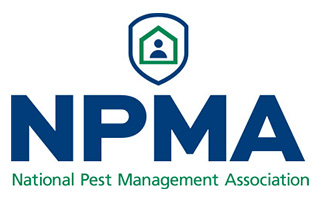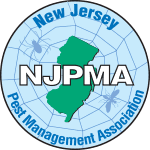STINGING INSECTS CONTROL

Stinging insects are insects that use a venom-filled stinger to defend themselves. Stinging insects are often described either as beneficial or unwanted, depending on where they build their nests. When nesting outside and away from people, stinging insects are beneficial, and are responsible for pollinating plants and crops. Predatory species control populations of nuisance insects. When stinging insects build their nests near homes, they become unwanted pests because the likelihood of a sting occurring greatly increases.
Do you have stinging insects in your home? Or maybe you want to learn more about how stinging insects control works. Check out the following mice information to clarify some questions you may have.
Library Shortcuts
- Are stinging insects dangerous?
- Why do I have stinging insects in my home?
- Where do stinging insects nest?
- Can I treat yellow jackets myself?
- Can I remove a wasp nest myself?
- Tips for property owners
Are stinging insects dangerous?
Stinging insects have the potential to be dangerous. While not all species of stinging insects are aggressive, they all have the ability to deliver painful, venom-filled stings. Their venom is powerful enough to trigger serious allergic reactions and anaphylaxis in some people, which requires immediate medical attention.
Why do I have stinging insects in my home?
Stinging insects are nesting and feeding on your property because it is offering them what they need to thrive. Stinging insects; depending on their exact species, feed on a variety of items, including insects, proteins, nectar, sweets, and honeydew. Compost piles, garbage cans, gardens, flowering vegetation, untreated wooden structures (carpenter bees), clogged gutters, outdoor eating areas, birdbaths, and ponds all attract stinging insects. Stinging insects can become a problem on almost any property.
Where do stinging insects nest?
Stinging insects are most active during the end of summer and early fall when their colonies are at their peak numbers and they are out foraging for food to feed their colony. Stinging insects build their nests in a variety of locations, as long it provides them with protection and shelter. Trees, rock crevices, utility poles, the ground, shrubs, and bushes are common stinging insect nesting spots. They may also build their nest underneath porches, decks, and roof eaves.

Can I treat yellow jackets myself?
Most of the DIY remedies suggest that homeowners get in close contact with the yellow jacket nests to spray or dump the solution into the nest; however, this can be extremely dangerous. You should never get near a yellow jacket nest without the proper safety gear on otherwise you’re subjecting yourself to the possibility of getting stung multiple times.
Can I remove a wasp nest myself?
If you are tempted to take down a wasp nest on your own, you’ve probably heard of the following strategies: fire/burning, dish soap, and using a bat. All of these dangerous acts can very easily cause the wasps to swarm and sting you severely. Professional pest control services differ from any DIY treatments because they have access to different tools. For example, wearing bee gear allows technicians to get very close to the nest without the risk of getting stung.

HONEY BEES
Honey bees can produce substantial amounts of honey, as can several other bee species. As pollinators, honey bees are critical to the environment and the food supply. Unfortunately, they also can become a medical and structural threat if they nest near people and buildings. Bees and other pollinators are protected in many states, so if an infestation should occur in or near a dwelling, you should consider contacting a local beekeeper to relocate the nest. A beekeeper can assess the situation and determine if it is feasible to remove the nest. This can be an intensive process, especially if the nest is large. For more information on honey bee nest relocation, contact a local beekeeper of an apiary society.
Tips for property owners
Listed below is a quick prevention guide to help you make your property as unappealing as possible to stinging insects:
- Caulk any holes found in the foundation and exterior walls of your home.
- Place a tight-fitting cap on all chimneys.
- Remove water sources.
- Place locking lids on all trash cans.
- When eating outdoors, try to keep food covered at all times and clean up all leftover food and drinks.
- Keep tree limbs, bushes, and shrubs a distance away from the outside of your home.
- Locate garden and compost areas a distance away from the outside of your home.
- Avoid wearing sandals or walking barefoot in the grass. Honeybees and bumblebees forage on white clover, a weed that grows in lawns throughout the country.
- Never swat at a flying insect. If need be, gently brush it aside or patiently wait for it to leave.
- Do not drink from open beverage cans. Stinging insects will crawl inside a can attracted by the sweet beverage.
- Avoid sweet-smelling perfumes, hair sprays, colognes, and deodorants.
- Avoid wearing bright-colored clothing.
- Yard work and gardening should be done with caution. Wearing shoes and socks and using work gloves will prevent stings on hands and feet and provide time to get away from an unexpected mound.
*If you have had an allergic reaction to an insect sting, it’s important that you see an allergist-immunologist.
Want a Free Estimate?
Need to Schedule Service?
Have a Questions?
WHAT WILL WE DO?
Our stinging insects control process typically consists of the following stages:
- Confirm or discard the existence of stinging insects or nests on the premises through an inspection
- Identify the factors that may be causing and contributing to the infestation
- Offer pest control programs to get the problem under control
- Treat the existing mice population and prevent future infestations
What our clients are saying
Our Partners and Awards
Service Areas
New Jersey:
Ocean County
Essex County
Passaic County
Morris County
Hudson County
Bergen County









